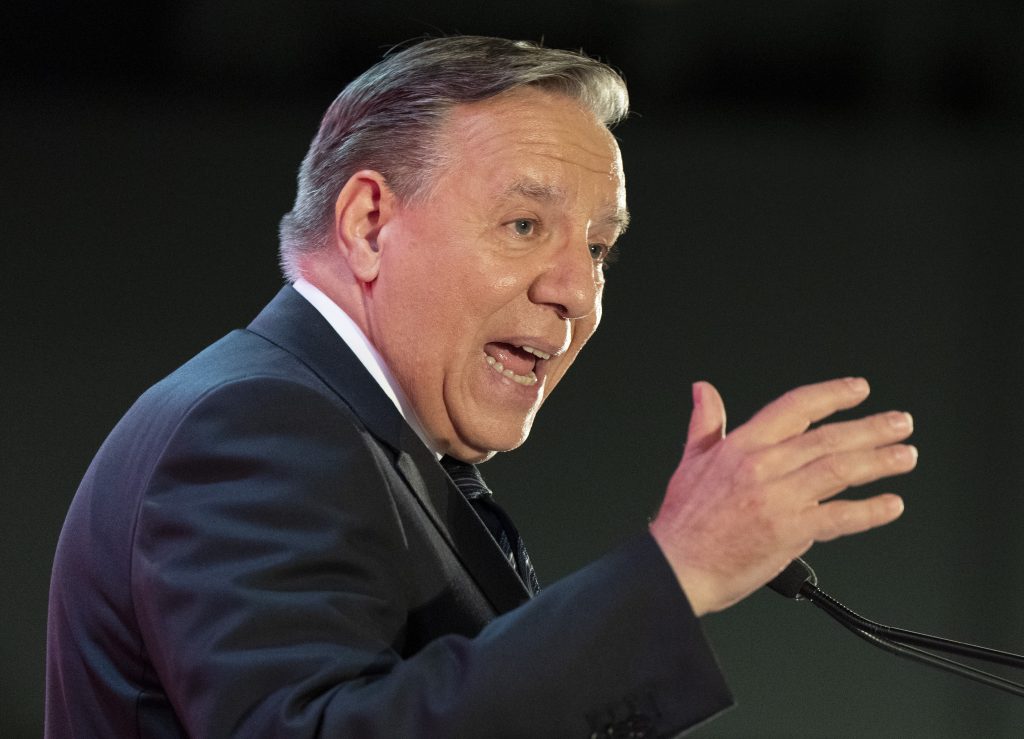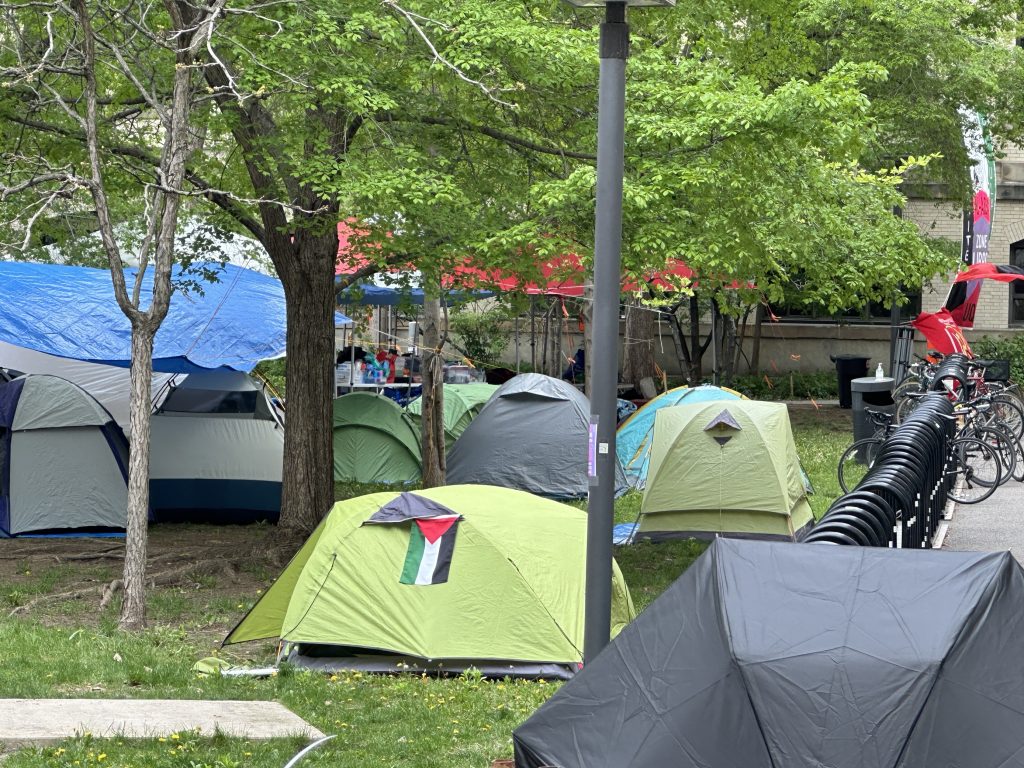Quebec Election Day 32: Legault, Boulet criticized for comments on immigration

Posted September 28, 2022 12:40 pm.
Last Updated September 28, 2022 5:12 pm.
Coalition Avenir Québec Leader François Legault says incumbent Immigration Minister Jean Boulet is no longer qualified to hold that job after Boulet said the majority of immigrants to the province “don’t work.”
Legault on Wednesday was forced to confront the statement Boulet made during a Sept. 21 election debate. The incumbent premier held a series of media interviews during which he said Boulet would no longer be immigration minister if the CAQ wins the Oct. 3 election.
Earlier in the day, Legault distanced himself from Boulet’s comments and told reporters his minister made a “serious error.”
“I regret that and I think Mr. Boulet regrets that,” Legault said. “It’s unacceptable, it’s not true what he said and he understands that it’s not true.”
During the debate last week in his riding of Trois-Rivières, Boulet said, “80 per cent of immigrants go to Montreal, don’t work, don’t speak French, or don’t adhere to the values of Quebec society.”
Boulet apologized on Twitter Wednesday for his comments, a recording of which circulated widely on social media. “The excerpt broadcast does not reflect what I think.” Immigrants, he said, “are a source of wealth for Quebec.”
Meanwhile, Legault on Wednesday was also forced to defend comments he made earlier in the day during an exchange on labour shortages with the president of the Chamber of Commerce of Metropolitan Montreal.
The incumbent Premier said it would be “suicidal” for the Quebec nation if more than 50,000 immigrants settled in Quebec every year, because it would be impossible to properly integrate newcomers and teach them French.
Legault told reporters later that the term “suicidal” used in that context is a French-language expression meant to describe something that is detrimental. “I think the vast majority of people, they understand that we have to have a balance between economy and protecting French and that’s what I explained,” Legault said.
Je suis désolé d’avoir mal exprimé ma pensée. L’extrait diffusé ne reflète pas ce que je pense. Il faut continuer de miser sur l’accueil, la francisation et l’intégration des immigrants, qui sont une richesse pour le Québec.
— Jean Boulet (@JeanBoulet10) September 28, 2022
Liberal Leader Dominique Anglade set aside her plans to discuss labour shortages on Wednesday and instead used her news conference to condemn the “dangerous” and “divisive”‘ comments made by Legault and his immigration minister.
“At some point, it’s enough, the apologies,” Anglade said. “It’s not just about apologizing each time, but to reflect about the words you use in the context of an election campaign.”
“As a politician you have to elevate the debate. You also have to see the issues for what they are,” she added.
“Right now you have François Legault that keeps dividing Quebecers on those issues. […] At the end of the day there is one party that doesn’t want to divide and wants to unite that is very consistent in terms of openness in terms of valuing the contribution of all Quebecers and if I look at the team of candidates that I have today this is a really good example of that and it’s the Liberal Party of Quebec and what I’m asking Quebecers is to go out and vote on October 3rd. Like more than 60 per cent of the population doesn’t want to have Francois Legault as the Premier, go out and vote.”
“I feel it more on the ground since last week people are getting really fed up about that level of division, really getting fed up with the type of leadership that we have in Quebec right now.”
Je ne laisserai jamais dire à François Legault et à Jean Boulet que des Québécois n’ont pas leur place ici, chez eux.
L'histoire du Qc a été bâtie par des Québécois de toutes les origines et continuera de l’être.
L'immigration est une richesse, pas une source de division. (1/2)
— Dominique Anglade (@DomAnglade) September 28, 2022
Québec solidaire co-spokesperson Gabriel Nadeau-Dubois was dumbfounded by the comments.
“Welcoming people to Quebec, does that lead us to the death of the Quebec nation?” Nadeau-Dubois asked. He said Boulet was simply following Legault’s lead.
“When the premier spends an election campaign badmouthing immigrants, is it any wonder that one of his ministers goes down the path opened by the premier?”
Parti Québécois Leader Paul St-Pierre Plamondon said at a press conference in Montreal that, “it’s irresponsible and once again, the CAQ talks about immigration without being able to speak about it, with the sense of duty, the sense of responsibility, and this is in a context where the CAQ model on immigration is unsustainable for the French language. So they can’t come up with a model that gives the French to the French language future and they can’t talk about it in a responsible manner. They fail on both important aspects of that topic, where we have a model that is that gives the French language a durability, a sustainability. And we speak about that topic in terms of model and in terms of integrating everyone as Quebecers…Quebecers that take a full part and full participation in our society.”

(CREDIT: Martin Daigle/CityNews)
St-Pierre Plamondon also forced to respond after comments a candidate made in 2011 and 2016.
Lyne Jubinville, a Parti Québécois (PQ) candidate in Laval’s Sainte-Rose riding, walked back some of her anti-Islam comments made on social media after facing pressure from the party’s leader.
On Facebook she wrote: “I fully recognize the right of new Quebecers and all Quebecers to believe in God and to go to the places of worship of their choice according to their religion. […] Although I am very critical of the effect of religions on women’s rights, I recognize that everyone in Quebec has the right to their convictions and therefore has the right to exercise their religion.”
“It’s a criticism about religions,” said St-Pierre Plamondon on Wednesday. “As I said, from a feminist point of view, it is okay and required that there’s a criticism of how religious fundamentalism may lead to diminishing women’s rights.”
Legault’s comments on immigration have caused a stir throughout the campaign.
Legault clumsily tied immigration to “violence” and “extremism” – comments he walked back – and days later he told a campaign crowd that non-French-speaking immigration is a threat to “national cohesion” in the province. And during the first leaders debate, he warned that if Quebec doesn’t gain more powers over immigration, it could end up like Sweden, which is struggling with a crime wave linked to immigration.
This report by The Canadian Press was first published Sept. 28, 2022.



